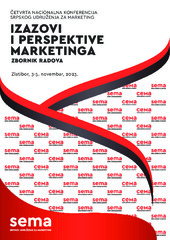Please use this identifier to cite or link to this item:
https://rfos.fon.bg.ac.rs/handle/123456789/2637| Title: | ANALIZA PERCEPCIJA I MOTIVA UČESNIKA NA TRŽIŠTU EKONOMIJE DELJENJA U SRBIJI ANALYSIS OF PERCEPTION AND MOTIVES OF PARTICIPANTS ON THE SHARING ECONOMY MARKET IN SERBIA |
Authors: | Krstić, Nikolina Veljković, Saša Kuc, Vukasin |
Contributors: | Hanić, Hasan Veljković, Saša |
Keywords: | ekonomija deljenja;percepcija;motivi;korisnici;provajderi;sharing economy;perception;motives;users;providers | Issue Date: | 2023 | Publisher: | Srpsko udruženje za marketing - SeMA | Abstract: | Ekonomija deljenja, kao novi ekonomsko-društveni model koji promoviše pružanje privremenog pristupa ograničenim resursima bez prenosa vlasništva nad istim, nosi brojne nepoznanice i kontroverze. Cilj ovog rada je da sagleda percepciju i najvažnije motive ključnih aktera ekonomije deljenja na području Srbije. Sprovedeno je eksploratorno istraživanje koje targetira provajdere (pružaoce usluga) i korisnike usluga na tržištu ekonomije deljenja. Kvalitativno istraživanje putem ekspertskog intervju primenjeno je na uzorku provajdera usluga ekonomije deljenja dok se kvantitativno istraživanje, sprovedeno putem onlajn anketnog upitnika, odnosilo na korisnike usluga deljenja. Rezultati pokazuju da su i provajderi i korisnici usluga ekonomije deljenja u Srbiji generalno zadovoljni iskustvom u ekonomiji deljenja – najviše funkcionisanjem platformi, ali i tačnošću i ažurnošću realizovanja usluga, pristupačnim cenama i ljubaznošću provajdera. Iako postoji saglasnost u tome da će se koncept razvijati, dosadašnji umereni intenzitet učestvovanja u ekonomiji deljenja verovatno će ostati na sličnom nivou. Kao glavno ograničenje navodi se nedovoljno zadovoljstvo promotivnim aktivnostima ekonomije deljenja. Kod obe grupe ispitanika preovladavaju ekonomski motivi korišćenja, odnosno motivi zarade i uštede u troškovima. Iako deljenje u svojoj osnovi ima socijalnu komponentu, društveni i ekološki motivi su znatno manje prisutni u Srbiji, naročito u poređenju sa zemljama EU. The sharing economy, as a new economic-social model that promotes temporary access to limited resources without transferring ownership, carries numerous unknowns and controversies. The aim of this paper is to examine the perception and motives of key stakeholders in the sharing economy in Serbia. An exploratory research targeting service providers and users in the sharing economy market was conducted. Qualitative research, based on expert interviews, was applied to a sample of sharing economy service providers, while quantitative research, conducted through an online survey, focused on sharing economy service users. The results indicate that both providers and users of the sharing economy in Serbia are generally satisfied with their experience in the sharing economy, particularly with the functioning of platforms, accuracy and timeliness of service delivery, affordable prices, and provider friendliness. Although there is an agreement that the concept will continue to develop, the current moderate level of participation in the sharing economy is likely to remain similar. Insufficient satisfaction with promotional activities is considered the main limitation of the sharing economy development. Economic motives, such as earnings and cost savings, prevail among both groups of respondents. Although sharing inherently has a social component, social and environmental motives are significantly less present in Serbia, especially when compared to EU countries. |
URI: | https://rfos.fon.bg.ac.rs/handle/123456789/2637 | ISBN: | 978-86-903768-2-7 |
| Appears in Collections: | Radovi istraživača / Researchers’ publications |
Files in This Item:
| File | Description | Size | Format | |
|---|---|---|---|---|
| bitstream_3888.pdf | ANALYSIS OF PERCEPTION AND MOTIVES OF PARTICIPANTS ON THE SHARING ECONOMY MARKET IN SERBIA | 5.82 MB | Adobe PDF |  View/Open |
Page view(s)
8
checked on Dec 28, 2025
Download(s)
10
checked on Dec 28, 2025
Google ScholarTM
Check
Altmetric
This item is licensed under a Creative Commons License

